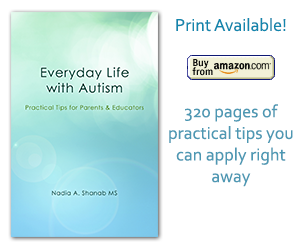Recess & Lunch Are Golden Opporunities to Socialize
Nadia Shanab | Uncategorized19 Jan 2013
We keep repeating over and over that the main two traits of autism are the lack of communication and social skills. Are educators and parents really doing enough to help improving these two areas of weakness?
Acadamic achievements in schools is with no doubt the main focus. Nobody denies the importance of teaching all kinds of subjects: Language Arts, Math, Science, Social Studies, Music, Art, Physical Education, you name it. Fortunately, during Physical Education periods there is still a great opportunity for students to cooperate, interact, and behave as a team. Some games are group games, others are individual games. Sportsmanship, generally speaking, is one of the most valuable virtues we would like the young generations to aqcuire, in order to live together in a civilized society.
Lunch and recess combined last about an hour every day. Do we really take advantage of these precious sixty minutes to create relationships, reinforce a social behavior and encourage communication among our students and help them socialize and build friendships? Is there enough support for these children to train them to live in a community and be part of it and develop the sense of “belonging”?
It is so sad to see most of the spectrum students isolated from the rest of the school population, eating and playing by themselves. If they are lucky they would stick to their peers from their SDC in groups of two or three students at most. Some of them spend the entire period of recess and lunch solely by themselves. The high-functioning and Asperger’s students are more likely to mingle with the general education students, thanks to their relatively higher communication and social skills.
What can we do during recess and lunch?
It would be great if school districts could provide a service such as sending professionals to train students to converse and communicate during lunch. Besides, modeling the appropriate table manners would bring students together more easily. Helping the students to develop empathy and show interest in other students whether on the spectrum or off the spectrum, will encourage and attract many people to approach them, and eventually connect with them, or even become friends with them.
This is also a good opportunity to teach turn taking, perspective taking, and respecting each other. As students learn all these skills they also learn to be more flexible, patient, independent, and compassionate.
Parents can also offer some help and support during this valuable socialization opportunities. It does not take a person with a Ph.D. in socialization to train kids to learn the basic rules of social behavior. Always remember that we are all social beings, born to live together, and naturally need to belong to a community. Both parents of special education and general education students can enjoy playing this role.
Parents can also come to school and find out who would be a potential candidate for their child to play with outside of school. Teachers can connect and match parents to arrange for play dates and sleepovers.
Parents and educators: be more proactive! You are already doing a wonderful job raising and teaching the kids. You might as well try one extra simple idea that might change your child’s/student’s life. Go the extra mile and have fun teaching children to participate in a simple ball game, it can only benefit the kids.
nadia shanab
Tags: asperger's syndrome, autism, communication, flexibility, independence, parenting, social interaction
